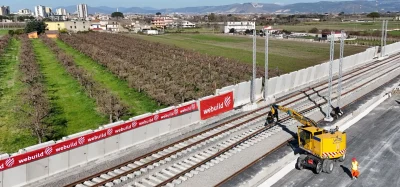ADIF’s Public Private Collaboration: High-speed lines to Galicia and Alicante
Posted: 22 September 2011 | | No comments yet
In 2010, the Infrastructure Extraordinary Plan (Plan Extraordinario de Infraestructuras (PEI)) of the Ministry of Public Works began, with expected tenders in the region of €17,000 million – the equivalent to 1.7% of Spanish GDP – which meant a turning point in the model used up until then in Spain to construct and maintain new public infrastructures.
The PEI envisages the application of Public Private Collaboration (PPC) to promote cooperation between public administrations and the private sector for the development and modernisation of infrastructures and public services of strategic interest. In this sense it is noteworthy that approximately 70% of investments will be allocated to railways to enhance suburban railway networks as well as freight transportation.
Singularity of the ADIF PPC
The ADIF PPC presents a new formula as assets and debts in the part of deferred investments are shown on ADIF’s balance sheet from the beginning. Similarly in PPC, the payment of part of the infrastructures is established upon completion of the work and set into service for a long period of time (from 20 to 25 years) – the specifications show that the deferred financing is guaranteed by ADIF so that financial entities qualify this debt as an ADIF corporation risk.
The successful bidder only assumes maintenance services at the facilities with certain quality standards, which will mean a guarantee of optimal preservation of facilities which are constructed according to this procedure.
Specific Purpose Vehicles (SPV)
Within a PPC scope for new infrastructures executed by ADIF, for every contract, Specific Purpose Vehicles (SPV) shall be founded, with participation by ADIF and successful bidders in charge of executing the works. Similarly a negotiated procedure with competitive publicity/dialog will be followed according to applicable standards as specified in the following phases:
- Previous phase: selection of candidates who shall participate in the business phase between bidders, according to technical and financial solvency criteria. A maximum of five candidates will be chosen
- Business phase: initial tenders shall be presented, which will be the object of negotiation of technical and economical aspects
- Final phase: upon presentation of the final offer and depending on the specified characteristics in the negotiation/dialog phase, the contract will be awarded according to the criteria established in the specifications of the tender. SPV company capital will vary between 5% and 10% of the investment budget arising from the award of the contract. In these companies, ADIF participates with 10% of the capital.
Payments during contract execution will be as follows:
- During contract execution, payments per work amounting to 40% of the contract award price will be due – the remainder will be shown on ADIF’s balance sheet as a debt.
- This debt is cancelled by means of deferred payments per work, which amount to 60% of the execution price and are effective every half of the year upon setting into service the facility, plus the corresponding capitalised interests. This quantity will be paid by ADIF, whichever problems arise with SPV or the facilities, according to a pre-established calendar.
- Finally, payments for availability are effective, which are the only ones with an amount depending on maintenance quality services of the infrastructures in the operation phase. With this payment, it will not only be maintenance costs that are strictly paid, but also dividends to SPV shareholders, taxes and management commission paid to successful bidders. The availability service period will be between 20 and 25 years, depending on the contract nature from the service setting.
Madrid–Alicante and Madrid–Galicia High-Speed lines
Currently, ADIF is working on several projects that are at different execution phases subject to a PPC regime – most of which are concerning different aspects of high-speed elements (track, electrification, signalling and safety installations). Two of these projects are connecting Madrid with Galicia and Alicante by high-speed lines.
The Madrid–Galicia High-Speed line
Since the end of April, track mounting and electrification facility works, signalling and safety facilities, as well as maintenance, have been tendered for the Madrid–Galicia High- Speed line by PPC. The current phase is for receiving invitations to tender until the end of June, followed by (after the process of choosing and inviting candidates) the phase of presentation offers and negotiation or dialogs.
These actions, divided in two contracts, are worth an estimated amount of €2,332.5 million. This way, track assembly and maintenance which is limited to the line between Olmedo (Valladolid) and Santiago de Compostela, has a tender budget of €647.3 million and is divided into two batches. On the other hand, works at facilities, including maintenance, in this case between Olmedo and Ourense, are bid for €1,685.2 million and three batches have been added.
As indicated, track assembly as well as railway facilities, are divided into batches – for each, a SPC will be created which – with participation from ADIF and successful bidders – will be in charge of works execution.
Therefore, track assembly and maintenance is divided into two batches: Olmedo–Pedralba de la Pradería and Pedralba de la Pradería–Santiago; whilst railway installations and their maintenance are carried out in three batches: energy facilities on the line Olmedo–Zamora–Pedralba de la Pradería; energy facilities on the line Pedralba de la Pradería–Ourense–Santiago, and telecommunication facilities, safety, civil protection and telecommunications’ facilities between Olmedo and Santiago.
The availability service period which is the period established for maintenance of constructed infrastructures, will be 25 years from placing into service, except for telecommunications and traffic control facilities, which will be 20 years. On the other hand, platform works that are still to be carried out on the Madrid–Galicia High-Speed line on the route between Lubian and Ourense will be bid by an ordinary public bid process.
The Albacete–Alicante High-Speed line
Also submitted to tender, under a PPC regime, is the construction and complete maintenance (over a 20 year period) of facilities on the route Albacete–Alicante on Madrid–Castilla La Mancha–Community of Valencia-Region de Murcia High-Speed line. This line currently connects the Spanish capital city with Cuenca, Requena-Utiel, Valencia and Albacete, and works continue so that high-speed also reaches Alicante and Murcia.
The facilities contract between Albacete and Alicante, with a tender budget of €446. 8 million, includes signalling, fix tele – communications, centralised traffic control, civil protection and safety, train protection, GSM-R mobile telephony and infrastructure systems for public operators of mobile telephony. This action envisages all necessary elements for the arrival of high-speed to Alicante in 2012. Also, this project relies on financial commitment from the European Investment Bank. Candidates have already been selected and first bids have been presented.
Five bids are of selected consortiums which group different companies, including:
- Ansaldo, Inabensa y Telvent
- Bombardier, Guinovart, EYM Instalaciones and Rover Alcisa
- Siemens GMBH, Indra and FCC Construcción
- Thales, Dimetronic and Cobra
- Isolux Ingeniería, EMTE, CAF and Alstom Transporte.
These bids show company field interests to participate in the ADIF PPC, and therefore are an important support to this collaboration system between public administrations and the private field.
About the Author
Cristóbal Pérez Monjardín studied finance and law at Oviedo University. Between 2000 and 2005, he was Budget Assessor for the Treasury Ministry before becoming the General Controller of Cantabria Autonomous Community until 2008, after which he became the Director of Financial Planning and Budget at ADIF.







